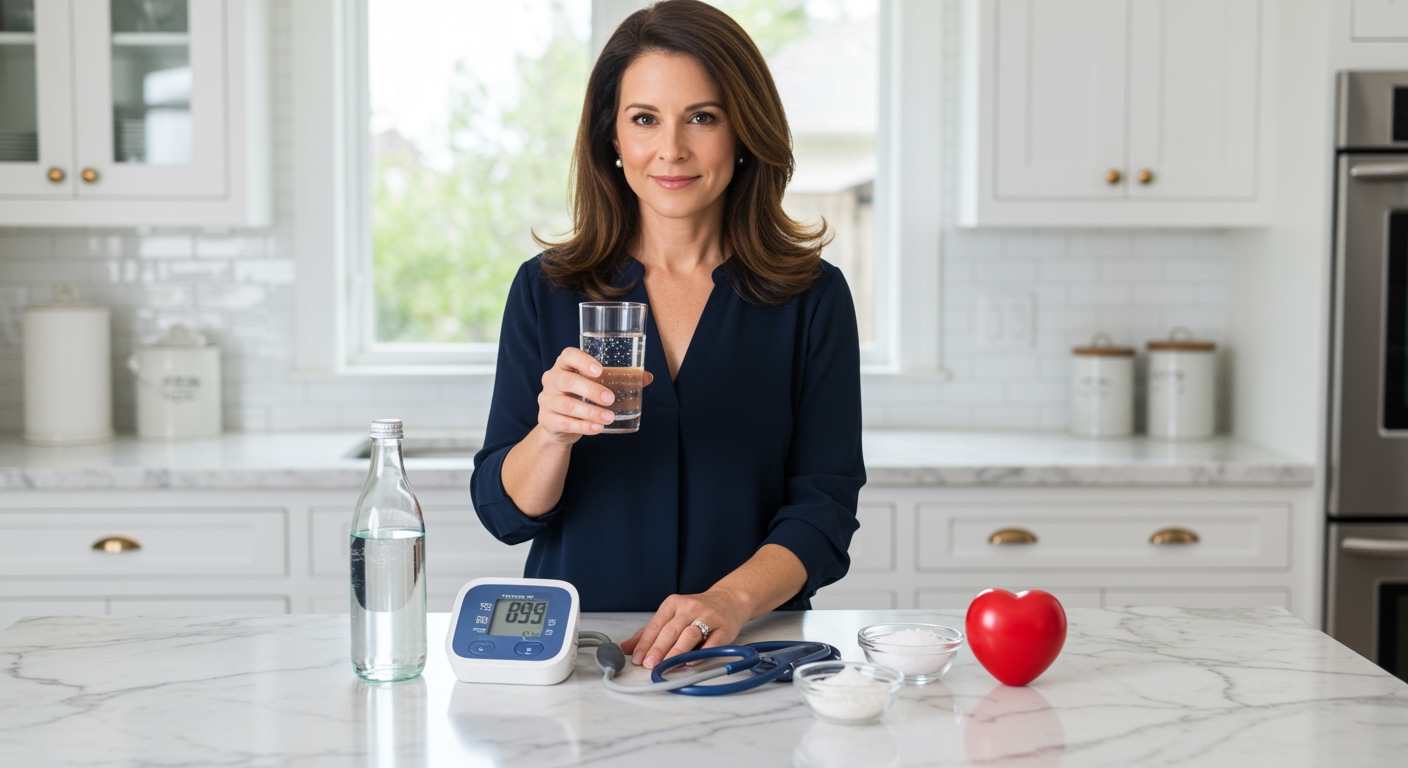✪ Key Takeaway: Sparkling water generally does not raise blood pressure and may help with hydration better than sugary drinks.
Introduction
You reach for that refreshing bottle of sparkling water and suddenly wonder if those bubbles might be doing something to your blood pressure.
This question comes up because many people with high blood pressure worry about everything they consume and how it might affect their cardiovascular health.
Hi, I am Abdur, your nutrition coach and today I am going to explain exactly how sparkling water affects your blood pressure and what the science really says about this bubbly beverage.
What Actually Happens When You Drink Sparkling Water?
Sparkling water is simply regular water infused with carbon dioxide gas under pressure.
When you drink it, the carbon dioxide creates those familiar bubbles and a slight acidic taste on your tongue.
Your body treats sparkling water almost exactly like regular water in terms of hydration and absorption.
The carbon dioxide quickly separates from the water in your stomach and gets expelled through burping or absorbed into your bloodstream and exhaled through your lungs.
This process happens so efficiently that the bubbles themselves have no direct impact on your cardiovascular system or blood pressure readings.
Research shows that plain sparkling water provides the same hydration benefits as still water without adding any compounds that could affect blood pressure.
✪ Fact: Your body processes sparkling water identically to regular water for hydration purposes.
Does The Sodium Content Matter?
The sodium content in sparkling water varies dramatically between different types and brands.
Natural sparkling water from springs often contains higher sodium levels because it picks up minerals from underground rock formations.
Artificially carbonated water typically has very low sodium content, usually less than 10 milligrams per serving.
For comparison, your body needs about 2,300 milligrams of sodium daily, and people with high blood pressure should aim for less than 1,500 milligrams per day.
Even the highest sodium sparkling waters contain only 50-100 milligrams per bottle, which represents a tiny fraction of your daily sodium intake.
However, if you drink multiple bottles daily and choose high-sodium varieties, this could contribute to your overall sodium consumption.
The key is reading labels and choosing sparkling waters with less than 35 milligrams of sodium per serving if you are managing blood pressure.
✪ Pro Tip: Always check the nutrition label for sodium content before choosing your sparkling water brand.
Can Sparkling Water Actually Help Your Blood Pressure?
Sparkling water might indirectly support healthy blood pressure through several mechanisms.
First, proper hydration helps maintain optimal blood volume and circulation, which supports normal blood pressure readings.
Many people find sparkling water more satisfying than plain water, leading to better overall fluid intake throughout the day.
When you choose sparkling water instead of sugary sodas or energy drinks, you eliminate added sugars and artificial ingredients that can contribute to weight gain and elevated blood pressure.
Some studies suggest that the minerals naturally found in certain sparkling waters, particularly magnesium and potassium, may have mild blood pressure benefits.
The bubbles can also create a feeling of fullness that helps some people reduce their intake of high-sodium snacks and processed foods.
Additionally, staying well-hydrated with any type of water helps your kidneys function efficiently, which plays a crucial role in blood pressure regulation.
✪ Note: Replacing sugary drinks with sparkling water provides more blood pressure benefits than the water itself.
Are There Any Risks To Consider?
Most people can drink sparkling water safely without any negative effects on their blood pressure.
However, some individuals experience bloating or gas from the carbonation, which might cause temporary discomfort but does not affect blood pressure.
People with certain digestive conditions like acid reflux might find that sparkling water worsens their symptoms, but this still does not impact cardiovascular health.
The main concern comes from flavored sparkling waters that contain added sugars, artificial sweeteners, or high levels of sodium.
Some brands add citric acid or natural flavors that can increase the overall sodium content significantly.
If you drink large quantities of high-sodium sparkling water daily, this could contribute to elevated blood pressure over time, especially if you are salt-sensitive.
The solution is choosing plain sparkling water or varieties with minimal additives and monitoring your total daily sodium intake from all sources.
✪ Pro Tip: Stick to plain sparkling water or low-sodium varieties to avoid any potential blood pressure concerns.
How Much Sparkling Water Is Safe Daily?
There is no specific limit on sparkling water consumption for most healthy adults.
Your daily fluid needs depend on your activity level, climate, and overall health, but most people need about 8-10 cups of fluids daily.
Sparkling water can contribute to this total just like regular water does.
If you have high blood pressure, focus on choosing sparkling waters with less than 35 milligrams of sodium per serving.
People taking certain blood pressure medications should maintain consistent fluid intake, and sparkling water works perfectly for this consistency.
Some individuals find that drinking sparkling water with meals helps them feel more satisfied and reduces their desire for high-sodium foods.
The key is treating sparkling water as part of your overall healthy hydration strategy rather than a magic solution for blood pressure management.
✪ Fact: Sparkling water counts toward your daily fluid intake just like regular water does.
The Bottom Line
Sparkling water is generally safe for people with blood pressure concerns and can be a healthy alternative to sugary drinks.
Good hydration supports good health, and the source of that hydration matters less than the consistency of your intake.
I would love to hear about your experience with sparkling water and any questions you might have about beverages and blood pressure management in the comments below.
References
At NutritionCrown, we use quality and credible sources to ensure our content is accurate and trustworthy. Below are the sources referenced in creating this article:





